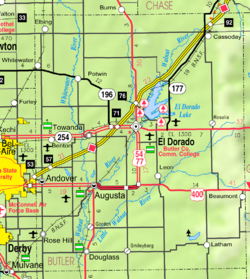2010 census
As of the census [11] of 2010, there were 718 people, 254 households, and 189 families living in the city. The population density was 1,795.0 inhabitants per square mile (693.1/km2). There were 267 housing units at an average density of 667.5 per square mile (257.7/km2). The racial makeup of the city was 93.3% White, 1.8% Native American, 0.1% Asian, 0.8% Pacific Islander, 0.4% from other races, and 3.5% from two or more races. Hispanic or Latino of any race were 2.6% of the population.
There were 254 households, of which 37.8% had children under the age of 18 living with them, 60.2% were married couples living together, 8.7% had a female householder with no husband present, 5.5% had a male householder with no wife present, and 25.6% were non-families. 23.6% of all households were made up of individuals, and 9.5% had someone living alone who was 65 years of age or older. The average household size was 2.60 and the average family size was 3.05.
The median age in the city was 42.7 years. 25.6% of residents were under the age of 18; 5.1% were between the ages of 18 and 24; 22.4% were from 25 to 44; 27% were from 45 to 64; and 19.8% were 65 years of age or older. The gender makeup of the city was 47.8% male and 52.2% female.
2000 census
As of the census [12] of 2000, there were 653 people, 232 households, and 171 families living in the city. The population density was 1,976.0 inhabitants per square mile (762.9/km2). There were 255 housing units at an average density of 771.6 per square mile (297.9/km2). The racial makeup of the city was 96.78% White, 0.31% Native American, 0.15% Asian, 0.15% from other races, and 2.60% from two or more races. Hispanic or Latino of any race were 0.46% of the population.
There were 232 households, out of which 36.6% had children under the age of 18 living with them, 62.5% were married couples living together, 8.2% had a female householder with no husband present, and 25.9% were non-families. 23.3% of all households were made up of individuals, and 11.6% had someone living alone who was 65 years of age or older. The average household size was 2.53 and the average family size was 2.99.
In the city, the population was spread out, with 24.3% under the age of 18, 5.5% from 18 to 24, 25.4% from 25 to 44, 20.8% from 45 to 64, and 23.9% who were 65 years of age or older. The median age was 41 years. For every 100 females, there were 89.3 males. For every 100 females age 18 and over, there were 83.0 males.
The median income for a household in the city was $42,813, and the median income for a family was $43,984. Males had a median income of $33,958 versus $21,417 for females. The per capita income for the city was $20,078. About 3.3% of families and 5.4% of the population were below the poverty line, including 5.0% of those under age 18 and 4.2% of those age 65 or over.



